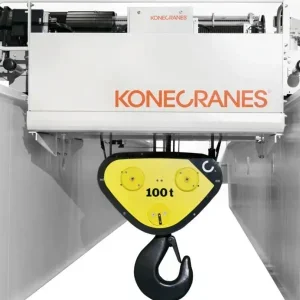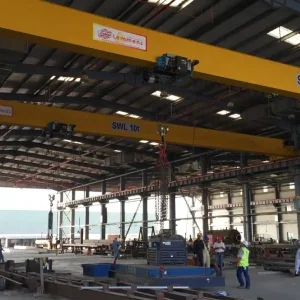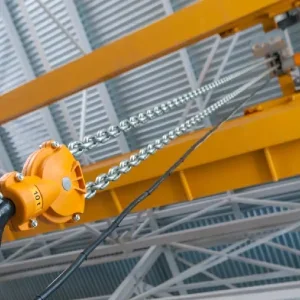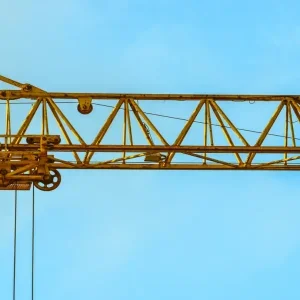Liqun Xiao, secretary general of the Material Handling Council of China (MHCC), said the market is growing by 30% every year. “This may start to slow but I expect there to be growth of some kind for the next five to 10 years,” he added.
The MHCC, which formed last year, has 100 members, of which around 20 were present at the show.
Abus, headquartered in Germany, arrived in China in 1997. Sales manager Davy He agreed that the Chinese market is growing by “20 to 30% every year,” and called China the “world’s centre for manufacturing.” Abus exhibited four new electric chain hoists up to 4t capacity – the GM2, GM4, GM6 and GM8.
China is enjoying the same trends as many countries over the world but, uniquely, even the paper industry (almost extinct in Germany, for example) is providing huge demand for lifting equipment.
But it is going to be a tough nut to crack for the latest influx of western companies.
Some western companies have opted to approach the Chinese market with caution, preferring to find a local distributor or dealer through which to introduce their products. Others are going it alone. Others are still working out what to do with the daunting but exciting prospect of working in China. Interestingly, six Spanish companies have decided to form a consortium and approach the Chinese market under one brand.
Teodoro Hernandez Martin, the commercial manager at Spanish company Ramon Galarza, admitted: “Last year, we knew nothing of China.” But it’s a place that does not take long to arouse the senses. You have to come here quietly, he stated.
Martin said that the company has been working to find a Chinese dealer. “They don’t like to buy direct from western companies here,” he explains. “They are not just going to walk up to us here [at CeMAT] and buy our products, for example,” he adds.
Martin went as far as to suggest that one day western companies may uproot their entire manufacturing plants and “supply the world”, as he put it, from China.
Also present among the Spanish contingent was Gosan. Export manager Juan Miguel Gutierrez agreed that the show was quieter than last year.
Wang Yun, director, sales and marketing division, at Demag Cranes & Components (Shanghai) Co., Ltd. said business is booming and agrees with Xiao that it is getting “busier every year.” He called China the “world’s workshop”, giving weight to Martin’s claim that one day it could literally become just that.
Yun recalled the days when Demag was one of three western companies (including Konecranes and Abus) in the region. “Now there are many more,” he said. Konecranes maintenance services director, Knut Stewen, who is based in Shanghai, agreed. He called the latest influx the “second wave” of western companies.
Stewen identifies paper as one of the biggest industries, while the automative and aluminium industries stand out among general machinery and paper for Yun. “There’ll be growth until 2018,” stated Yun.
Demag said it can complete an order in China within four weeks. All cranes in the Demag range are manufactured there, while the design team remains back home in Germany. For a crane that is manufactured in Germany, customers can expect delivery between three and five months. It is what Yun describes as a Chinese/German company – and that is how it is pitched to the local market. The selling point is that the products are “more advanced” than those which can be found on the local market, Yun explained.
Some 26 Demag sales offices already exist in China, with plans in place for another “four or five” to be set-up within the next 12 months. The manufacturing of cranes, however, is limited to just one plant.
Yun admitted that the market still has a long way to go before it catches up with western technological standards. In fact, the wait could be as long as 10 to 15 years, he said.
US-based Gorbel has four people currently located in China – based at the facility it opened in May this year. David Butwid spoke of the challenge that faces western companies. “There are a number of ways people can approach the market,” he said. “For example,” he continued, “with overhead cranes it might be possible to go direct to the customers but with work station cranes you need contacts.” Scope for work station cranes is huge – spanning across assembly and machinery industries.
Gorbel is happy with its progress and order numbers, despite recalling teething problems with its supply chain. Butwid noted that the size of orders in China tend to be bigger than they do in the States.
Yoo, Sung Chul, president of Bando Cranes, is enthused by the Chinese market. Bando exhibited its 150t capacity Ceo Hoist 900. The unit was new from the head office in Korea around six months ago and will be imported into China. The hoist is used with a hook and, thus, will be pitched to a variety of industries.
Bando highlighted its “compact size, lower price and ease of maintenance” as key advantages to other similar units on the market.
Japanese manufacturers Elephant Chain Block Co., Ltd. celebrated its first show overseas at CeMAT – and manager Keita Bai was encouraged by the interest its stand, sporting a floral arrangement from a local dealer, generated. There were no new products on show, however.
ABM Greiffenberger exhibited hoist and travel drives for single and double girder cranes, wire rope hoists and jib cranes.
Its range of hoist units now comprises the complete product family for loads from 3.2 to 25t, including single speed travel drives within the Eco Line range, two-speed drives within the Profi Line and frequency controlled units within the Automation Line.
German hoist manufacturer JD Neuhaus introduced its new series of PROFI TI-series hoists. It exhibited the new series with a self-lubricating motor called the 025-2TI.
The remote control companies were out in force – and they have a battle on their hands if Yun’s prediction that it will take the Chinese 10 to 15 years to catch up with western technological standards proves correct.
Two new remotes (namely the Winner and Tunner) were on show on Barcelona, Spain-based Itowa’s stand. Both remotes, of which prototypes were on the stand, come with new receivers. The Winner’s main feature is an advanced data feedback system, while Itowa are hoping to tempt the overhead crane market with the Tunner.
Itowa also exhibited a “black box” – called the SCI. Available this month (November), the black box allows the crane to be controlled remotely from an internet based connection. It also offers feedback to the handset from the height and load of the crane.
Export manager Sylvia Lacambra Cuixart said of the black box: “If you forget to turn the lights off before you leave, you can log on and turn them off from your home or office without having to return to the facility.”
Cuixart identified huge potential in China. “Here [in China],” she said, “industry is bigger than construction – that’s different to Europe.” She explained that this is good for remote control companies because people like remotes on industrial cranes more than they do on construction models.
Tele Radio launched its new joysticks for EOT cranes. Marketing manager Arne Hagen said the company is continuing to grow in China, following the successful introduction of its facility in Xiamen. While it was hoped that the new joystick would attract interest, Hagen admitted that the main purpose of the show was brand recognition.
HBC-radiomatic used the show to launch its new Micron 6 series, which is, in fact, the same size as the previous Micron 5. Alan Zeng, Shanghai assistant manager, explains that a pin number system ensures added security. Feedback to the handset from the height and weight of the load is also available.
One impressive feature includes an alarm system, which sounds when the handset is dropped or the visual panel is turned face down and, thus, out of sight of the operator.
The unit is completely new to the Chinese market and only a few handsets are actually in the country at this stage. However, Zeng insisted that it is available “immediately.”
Ikusi exhibited its TN70 family, which will be available to customers in January. The so-called mini range will be on the market at the same time.
Ikusi opened an office in Shanghai last month (October), where two people are charged with the responsibility of “increasing the popularity of remotes,” as commercial director Pedro Esnaola put it.
Autec used the show to exhibit its model D series of remotes, including a receiver that serves all transmitters. Sales and marketing director Domenico Didone said: “Business is certainly growing [in China].”
German-based NBB Controls & Components AG introduced the so-called Planar line of wireless remote controls. It said the new kit is “compact, handy, easy to operate and robust.”
NBB will open a facility in Shanghai within the next two months where four members of staff (two sales, one service and a ‘book-keeper’) will build the profile of the brand in the local market.
Meanwhile, Hangzhou Zheqi Cranes Co., Ltd. exhibited its new ZH series wire rope hoist. Import and export manager Jacy Chen was encouraged by this year’s event, but did share sentiments that visitor numbers were down on last time.






